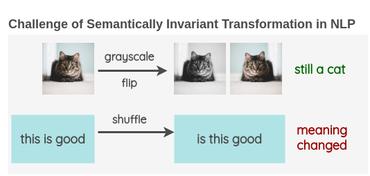Search Results for author: Jakub Simko
Found 11 papers, 7 papers with code
Authorship Obfuscation in Multilingual Machine-Generated Text Detection
no code implementations • 15 Jan 2024 • Dominik Macko, Robert Moro, Adaku Uchendu, Ivan Srba, Jason Samuel Lucas, Michiharu Yamashita, Nafis Irtiza Tripto, Dongwon Lee, Jakub Simko, Maria Bielikova
However, it is susceptible to authorship obfuscation (AO) methods, such as paraphrasing, which can cause MGTs to evade detection.
Effects of diversity incentives on sample diversity and downstream model performance in LLM-based text augmentation
1 code implementation • 12 Jan 2024 • Jan Cegin, Branislav Pecher, Jakub Simko, Ivan Srba, Maria Bielikova, Peter Brusilovsky
The latest generative large language models (LLMs) have found their application in data augmentation tasks, where small numbers of text samples are LLM-paraphrased and then used to fine-tune downstream models.
Is it indeed bigger better? The comprehensive study of claim detection LMs applied for disinformation tackling
no code implementations • 10 Nov 2023 • Martin Hyben, Sebastian Kula, Ivan Srba, Robert Moro, Jakub Simko
This study compares the performance of (1) fine-tuned models and (2) extremely large language models on the task of check-worthy claim detection.
MULTITuDE: Large-Scale Multilingual Machine-Generated Text Detection Benchmark
1 code implementation • 20 Oct 2023 • Dominik Macko, Robert Moro, Adaku Uchendu, Jason Samuel Lucas, Michiharu Yamashita, Matúš Pikuliak, Ivan Srba, Thai Le, Dongwon Lee, Jakub Simko, Maria Bielikova
There is a lack of research into capabilities of recent LLMs to generate convincing text in languages other than English and into performance of detectors of machine-generated text in multilingual settings.
ChatGPT to Replace Crowdsourcing of Paraphrases for Intent Classification: Higher Diversity and Comparable Model Robustness
2 code implementations • 22 May 2023 • Jan Cegin, Jakub Simko, Peter Brusilovsky
The emergence of generative large language models (LLMs) raises the question: what will be its impact on crowdsourcing?
Multilingual Previously Fact-Checked Claim Retrieval
1 code implementation • 13 May 2023 • Matúš Pikuliak, Ivan Srba, Robert Moro, Timo Hromadka, Timotej Smolen, Martin Melisek, Ivan Vykopal, Jakub Simko, Juraj Podrouzek, Maria Bielikova
Fact-checkers are often hampered by the sheer amount of online content that needs to be fact-checked.
Automated, not Automatic: Needs and Practices in European Fact-checking Organizations as a basis for Designing Human-centered AI Systems
no code implementations • 22 Nov 2022 • Andrea Hrckova, Robert Moro, Ivan Srba, Jakub Simko, Maria Bielikova
Second, we have identified fact-checkers' needs and pains focusing on so far unexplored dimensions and emphasizing the needs of fact-checkers from Central and Eastern Europe as well as from low-resource language groups which have implications for development of new resources (datasets) as well as for the focus of AI research in this domain.
Auditing YouTube's Recommendation Algorithm for Misinformation Filter Bubbles
1 code implementation • 18 Oct 2022 • Ivan Srba, Robert Moro, Matus Tomlein, Branislav Pecher, Jakub Simko, Elena Stefancova, Michal Kompan, Andrea Hrckova, Juraj Podrouzek, Adrian Gavornik, Maria Bielikova
We also observe a sudden decrease of misinformation filter bubble effect when misinformation debunking videos are watched after misinformation promoting videos, suggesting a strong contextuality of recommendations.
Monant Medical Misinformation Dataset: Mapping Articles to Fact-Checked Claims
1 code implementation • 26 Apr 2022 • Ivan Srba, Branislav Pecher, Matus Tomlein, Robert Moro, Elena Stefancova, Jakub Simko, Maria Bielikova
It also contains 573 manually and more than 51k automatically labelled mappings between claims and articles.
An Audit of Misinformation Filter Bubbles on YouTube: Bubble Bursting and Recent Behavior Changes
1 code implementation • 25 Mar 2022 • Matus Tomlein, Branislav Pecher, Jakub Simko, Ivan Srba, Robert Moro, Elena Stefancova, Michal Kompan, Andrea Hrckova, Juraj Podrouzek, Maria Bielikova
We present a study in which pre-programmed agents (acting as YouTube users) delve into misinformation filter bubbles by watching misinformation promoting content (for various topics).
A Study of Fake News Reading and Annotating in Social Media Context
no code implementations • 26 Sep 2021 • Jakub Simko, Patrik Racsko, Matus Tomlein, Martin Hanakova, Robert Moro, Maria Bielikova
In this paper, we present an eye-tracking study, in which we let 44 lay participants to casually read through a social media feed containing posts with news articles, some of which were fake.

